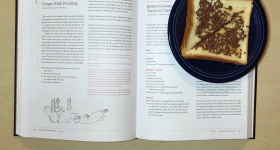The front cover of Bandi’s The Accusation, a new collection of short stories, directs the imminent reader to hidden depths in the enigma that is North Korea. An image of a North Korean mural is torn in the middle to show the book’s title; the pseudonym for the writer; as well as the subtitle of the book, which reads: “Forbidden Stories from Inside North Korea.” While the stories are fictional, the characters and circumstances Bandi describes are not part of a dystopian novel but rather real people of all classes and backgrounds in the oppressive society that he lives in.
The Accusation: Forbidden Stories From Inside North Korea unravels seven stories by Bandi, the pseudonym for the writer who still resides in North Korea. Smuggled out by an escaping relative, Bandi’s manuscript was translated by Deborah Smith and is his first and only published book to date. Bandi was born in a northeastern province of Hamgyeong and was a child during the start of the Korean War. Bandi gravitated towards literature and began to make a name for himself when his writing was first published in North Korean magazines in his 20s. After putting off his writing career, he eventually joined the Chosun Literature and Art General League, where he became a contributor to different periodicals. Bandi was spurred into action after living through the famine of the 1990s after he witnessed many people live through miserable conditions and committed to denouncing North Korea’s contradictory socialist system.
Despite the amount of work Bandi produced, the only person to read his work was himself. Knowing that there would be no other way for his work to spread around, he dreamed of being able to circulate his words to the outside world. This dream turned to reality with the news of the defection of a close relative. Through various strokes of luck and good fortune, the manuscript found itself in the hands of Do Hee-yun, a representative for an advocacy group for North Korean refugees.
The stories in Bandi’s work are in the third person, with the exception of the first story, which is written in the first person in the format of letters and journal entries. While each story deals with characters of different backgrounds and locations, all of them exude a lingering feeling of melancholy evoked by the characters’ personal struggles and bleak surroundings. Although each story comprises fewer than 50 pages each, Bandi manages to describe each character’s pain, desire, shame, fear and displeasure while cutting deep into the contradictory nature of the dictatorship.
The Accusation isn’t a formal exposé of the conditions in North Korea, but rather an exploration of the day-to-day lives of its people and the interpersonal conflicts that arise from their conditions. One story involves a grandmother who, after spending hours upon hours waiting for a train, takes matters into her own hands and walks down a highway to her destination. However, she has a chance meeting with Kim Il-sung, who takes her along his motorcade in order to secure good publicity. As she rides in the motorcade, she eventually realizes the reason for the delays on both the roads and rails: Kim Il-sung chose a route that allowed him to view the scenery in a way that was most convenient for him. She later learns that after the motorcade passed, the rails opened up, and in the ensuing frenzy, her husband and granddaughter were severely injured. As the three recover, an interview of the grandmother praising Kim Il-sung’s “hospitality” plays from loudspeakers, further exacerbating the grandmother’s guilt. She ends the story by telling a folktale of a demon that hides the misery of his slaves by changing their cries of pain to laughter, deceiving those on the outside to believe that they are indeed happy. The comparison between the story and the state of North Korea’s media coverage is blindingly clear, and further contradicts the information relayed from the North’s government. In describing the ordeals of a miner who visits his ailing mother, Bandi vividly and hauntingly presents not only the injustices North Koreans experienced but also the compassion and persistence they maintained under the crushing weight of the dictatorship.
A recurring aspect of the stories are the dates that Bandi places at the end of each story. The different dates range from 1989 to 1995 and reflect the time period in which each respective story takes place, as well as the date the story was finished by the writer. Even though the stories are set 20 years in the past, there is little doubt that conditions have not changed for those living there, allowing The Accusation to be a still-relevant testament of life under the isolated state.
Part of the lasting impression of Bandi’s work lies within the criticisms and objections of the strict customs and rules of the dictatorship he describes in each story. Two of the stories detail how events held by Kim Il-sung utterly disrupt the lives of the populace and the catastrophic effects these disruptions create. Another story details how Party officials constantly scrutinize a mother because she keeps her curtains drawn to keep her son calm and ends with (spoiler) the woman and her family being sent away for “jeopardizing the preservation of our Party’s ideology. … ” While each story may not have the same impact as others, they still each hold their own indictment of the dictatorship and the Party in general.
Although there have been multiple works of the same tone written by defectors about the North Korean government, The Accusation marks its own spot in history as it is the only published book that denounces the government while the writer remains in North Korea. The afterword of the book, written by Kim Seong-dong of Monthly Chosun, describes Bandi’s historical significance and background, as well as the arduous path taken in order to get The Accusation published. In the final lines of the foreword, Seong-dong writes, “Rather than himself trying to escape from North Korea, the writer Bandi has sent his work out as an envoy, risking his life in the process. [...] This work should be heard as an earnest entreaty to shine a spotlight on North Korea's oppressive regime.”










Comments